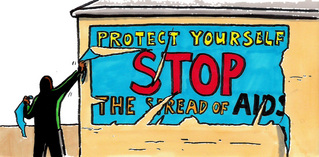Using community conversations to combat stigma within church groups

© Peter Strauli for the Manicaland HIV Prevention Project
Community conversations (CCs) are an interactive process which brings people together, engaging communities in discussion and exploration of the underlying causes fuelling a social phenomenon such as HIV/AIDS stigma in their environment. CCs are based on the recognition that people have the capacity, knowledge and resources to transform individually and collectively once they develop a sense of ownership of a problem, confidence in their abilities to the problem and are able to identify recipes for individual and group action.
To combat stigma, we conducted a total of 24 CCs comprising of three sets of three monthly CCs were held with eight church groups of Anglican, Roman Catholic and Apostolic sect. The purpose of these CCs was to offer dialogical spaces for church groups to share what they knew about HIV and AIDS. During these CCs, we sought to involve community church groups to brainstorm on what can be done to tackle AIDS stigma. The main aim of this process was to enable community groups to build upon existing community capacity and create positive social identities and social representations of HIV/AIDS. We facilitated the development of a space for church members to draw upon local knowledge to design and implement local programmes. Many participants in the CCs began to critically reflect on the obstacles facing their churches and wider community to be HIV competent and enabled many people to think of social change.
To combat stigma, we conducted a total of 24 CCs comprising of three sets of three monthly CCs were held with eight church groups of Anglican, Roman Catholic and Apostolic sect. The purpose of these CCs was to offer dialogical spaces for church groups to share what they knew about HIV and AIDS. During these CCs, we sought to involve community church groups to brainstorm on what can be done to tackle AIDS stigma. The main aim of this process was to enable community groups to build upon existing community capacity and create positive social identities and social representations of HIV/AIDS. We facilitated the development of a space for church members to draw upon local knowledge to design and implement local programmes. Many participants in the CCs began to critically reflect on the obstacles facing their churches and wider community to be HIV competent and enabled many people to think of social change.